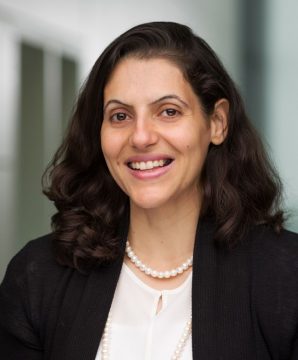A team of researchers at Dartmouth’s Geisel School of Medicine, led by Inas Khayal, PhD, has received a $1.2 million funding award from the American Cancer Society (ACS) to identify local healthcare disparities for over 2,000 hospitals providing cancer care across the U.S. to help them improve healthcare disparities and achieve better outcomes for patients.

The award is one of 89 new extramural discovery science research grants (totaling $54.3 million) recently approved by the ACS—the largest non-government, non-profit funding source of cancer research in the U.S. The grants will fund investigators at 65 institutions across the country beginning on January 1, 2023.
As part of the initiative, the ACS has established a number of priority areas to advance its mission of improving the lives of patients with cancer, their families, and caregivers through research, patient services, and advocacy. These include cancer etiology (causes), obesity/healthy eating, active living, diagnosis and screening, treatment, survivorship, and health equity.
Within the area of health equity and access to care, the Dartmouth team will work to identify disparities in palliative and end-of-life cancer care for each hospital and its community. It will also develop a toolkit of processes for the institutions to use to identify hospital and patient social determinants of health—economic and social conditions influencing health status—that contribute to these disparities.
“Quantifying a hospital’s local healthcare disparities is currently a high-cost, resource-intensive process,” says Khayal, an assistant professor at The Dartmouth Institute for Health Policy and Clinical Practice and of biomedical data science at Geisel, and an adjunct professor of computer science at Dartmouth College. “We aim to remove those barriers and equip hospitals and communities with the information, tools, and processes they need to improve health equity and access to care for their patients.”
For the five-year project, the researchers will utilize claims data from Medicare to analyze the end-of-life care received by more than two million patients with advanced cancer who died between 2015 and 2022.
“This ACS grant will help us overcome the siloed and disconnected approaches that we have seen in prior health equity research,” explains Khayal. “For example, when a patient’s healthcare delivery is sent to different research specialists for analysis, they each end up providing a disconnected story of separate results. Improvement researchers then have to develop improvement care strategies from these disconnected pieces of the story.”
In contrast, Khayal and her team will use methods from model-based systems engineering and data science to map each patient’s entire healthcare delivery journey, providing a holistic and detailed view of their care. “Instead of dividing the data into disconnected pieces, we’ll integrate it into patient-level and hospital-level frameworks that show what has happened with each person’s care,” she says. “It’s a very novel approach that honors the arc of a patient’s healthcare journey as it truly happened.”
It is important to recognize that every hospital environment is unique, each having very different resources, says Khayal. “The beauty of our approach is that it will allow us to provide hospitals and communities not just with actionable information but also with process tools for them to tailor bespoke solutions that reduce health disparities in the context of their local capabilities,” she says.
The Dartmouth Institute for Health Policy and Clinical Practice is a world leader in studying and advancing models for disruptive change in healthcare delivery. The work of Dartmouth Institute faculty and researchers includes developing the concept of shared decision-making between patients and healthcare professionals, creating the model for Accountable Care Organizations (ACOs), and introducing the game-changing concept that more healthcare is not necessarily better care.